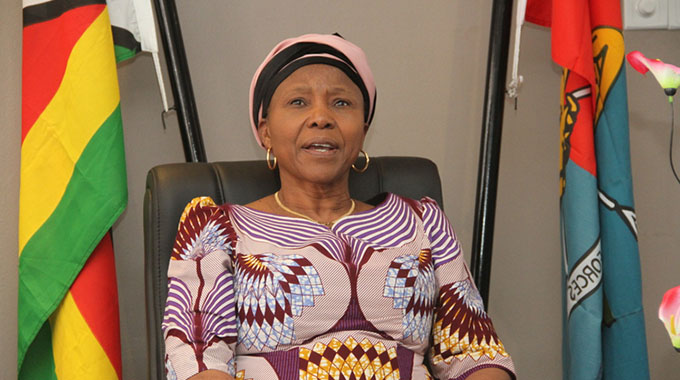EDITORIAL COMMENT: Agric Ministry a worthy winner, example to all

That the winning Government ministry in the Integrated Results-Based Management System was the Ministry of Lands, Agriculture, Fisheries, Water and Rural Development will hardly come as a surprise, with its administrative head topping the list of permanent secretaries.
For a start its achievements are there, starting with the fact that most of the food all of us eat was grown by Zimbabwean farmers and that stocks of most products are, even in March, good enough to take us well into the next harvests.
The gaps, mainly oil seed and milk, are being rapidly filled with imports of those falling fast. Rising tobacco exports are about to be supplemented by a return to decent cotton exports, hopefully more and more as thread, cloth and clothes rather than just fibre, and food exports can soon resume as good harvests meet all local demand and refill needed reserves. Drilling rigs are continually on the move, stopping in each village for a few days to drill the borehole and then moving on.
Of course, while Minister Anxious Masuka and Permanent Secretary John Basera collected the deserved awards from President Mnangagwa yesterday, a lot of their achievement comes from their effective management and leadership of a large professional and expert staff who know what they are doing, do it really well and can rely on the backing and co-ordination of the two at the top.
So the recognition that the ministry has achieved is a recognition for the entire service, and no doubt that will filter all the way down, and along with the congratulations there will be the message that they must really excel this year. One factor of good leadership is the general atmosphere that absolute perfection is not only attainable, but should be the general state of affairs.
The long and complex title of the ministry reflects the fact that it is a wide-ranging organisation, but all those directorships and agencies and parastatals have to be pulling in the same direction and need to be working together, in both series and parallel, to do the final fundamental aim of the ministry, grow the food and help all farmers earn more money.
Over the last few years, the Second Republic in fact, the ministry has been ticking President Mnangagwa’s boxes, and he sets the tone and the targets, as well as choosing the top ranks who follow his directives on both and are supposed to deliver.
There were a lot of well-intentioned, but indifferently administered programmes, there was low morale and there was a degree of cheating and some corruption. The President wanted delivery, efficacy, management and implementation, and has also stated frequently, as he did yesterday, that he needs people to think creatively and innovatively when they are meeting those targets, but that is the method, rather than the goal.
So looking at the criteria. Delivery means getting all the bits and making sure that those who need them get them. In Lands, Agriculture, Fisheries, Water and Rural Development that is primarily the farmers, all of them from the smallest-scale grower to the largest estate, but also the industries needing raw materials and the rest of us who need to eat three meals a day.
The ministry has a large staff involved in research and in its extension work. On the research side it has its own stations, plus it maintains excellent and very close contact with agricultural faculties at universities and with private sector research.
That strong sprinkling of higher degrees and academic titles across the ministerial departments displays the rotation of staff between the research and the practical elements. A lot of the delivery function needs first of all to know what must be delivered and then getting the fruits of this research to the farmers who actually have to grow the crops.
So to take one example, the need to make input schemes effective meant that new techniques were needed so the farmers could use the inputs.
Pfumvudza/Intwasa is one such result; the research types worked out how conservation farming would work, then did the practical research to work out how big a realistic plot needed to be, and what crops would work, then the extension workers learnt the theory and practice, then the farmers were trained and then the extension workers made sure they were doing it properly.
And the whole system of registering farmers, organising inputs, and ensuring delivery had to be revamped and often recreated. All this required a lot of innovation and creativity, plus changes to make it better such as the greater intention in the present season on the right varieties of crops.
On efficacy, that is does it work, again some major changes. Some of the new processes made corruption almost impossible; others made sure everything worked properly, with one change last year being those communal committees, with outsiders like the local school head involved, that ensured everyone entitled to inputs and support got it and so eliminating a huge swathe of cheating or incompetence and ensuring that there was feedback in both directions.
Resources are never enough, anywhere, but making every dollar work very hard helps. Extension staff need to see all their farmers, so they need transport. A conventional solution would be to work over two decades to get four-wheel drive vehicles. The innovative solution was to recognise that you can buy more than a score of rugged quality motorbikes instead of one 4×4 and make your staff mobile quickly. So it was done.
One major support of the agriculture ministry is the Ministry of Finance and Economic Development and its budgets. But when you can show that every dollar budgeted will produce a minimum of 10 times as much wealth, within 12 months, the banker types at the Treasury will take note, and development partners will be excited that support is not being used to fill holes with money.
Even the private sector gets excited; it relies almost totally on the ministry databases to confirm that the farmers it contracts are physically on the land, have land and an address, and have the track record they claim they have.
Management sort of answers itself with the results. But we should add that management is not just having everything running, but everything running together with the arm-in-arm requirements between departments so the farmer gets the training, inputs, water, help with pests and so on at the right time and on time.
Implementation, which was perhaps the most deficient, can be seen in the results. Brilliant ideas are useless unless they are used, and again while a report card has to split up the categories, this requires hitting the other three, and hitting them all at very high level. It all fits together. The farmers, being farmers, will continually complain, but the ministry by now knows how to interpret whether the complaints are serious and justified, or whether they are just farmers grumbling to keep in practice.
The point is that the ministry listens, to the 2 million or so farmers and its own staff, and then makes the corrections and changes or adds to policies to make everything work better.
Of course President Mnangagwa is going to raise the bar on the new contracts signed yesterday, but he must be doubly pleased with the winning ministry since the quickest way of achieving Vision 2030, the upper middle-income country, is to see the 60 percent of the population living off farming become upper middle-income families, and that is the ultimate goal of the agriculture ministry, so he will be pushing, as well as providing the needed support.
So congratulations to the whole competent and high-morale ministry, as well as the leadership. You have done well.









Comments